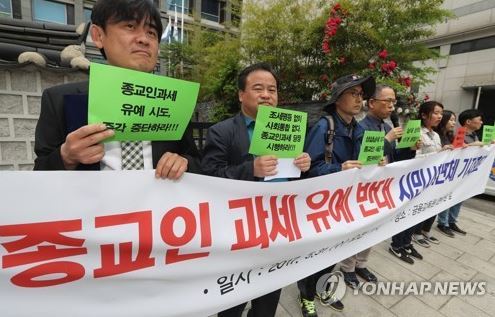Religious groups in South Korea are preparing for the imposition of taxes on clergy members starting next year, as the government's new tax code revision blueprint did make changes to the upcoming tax duty plan pertaining to clerical workers.
Last week, the government announced a plan to amend the current tax code to raise the rate for the superrich and conglomerates, in what many see as a move to finance the Moon Jae-in government's pledges on job creation and social welfare expansion. Changes were not made to the newly established clergy taxation clause, which goes into effect starting January 2018.
"If it's not included in the announcement, then that means the taxing on clerical workers will begin next year as scheduled," a senior finance ministry official said.
The bill is part of the government-led efforts to establish equal taxation. Religious figures have been exempted from paying income taxes for decades, given that their work is regarded as a spiritual service, not labor.
The Presbyterian Church of Korea's Tonghap branch, one of the country's largest religious groups, has agreed on the taxation from early on, having held seminars and education programs for its members since last year. Last month, the group held a meeting with the finance ministry and the National Tax Service to exchange views on the pending taxation plan.
 |
In this file photo, a group of activists from the Korea Taxpayers` Association hold a protest rally in front of the State Affairs Planning Advisory Committee building in central Seoul on May 31, 2017, demanding that clerical workers pay taxes like all waged workers. (Yonhap) |
"The imposition starting next year is the right course of action. The government has deferred it for four years since first announcing it in 2013. There's no more cause for postponing it," said Kim Jin-ho, former head of the branch's taxation committee, who attended the meeting with the finance officials.
The National Council of Churches in Korea also issued a statement accepting the newly imposed duties, saying, "Everyone comes under the obligation to pay one's taxes."
But the more conservative-leaning protestant circles are against the pending taxation plan, especially the Presbyterian Church of Korea's Hapdong branch, an Evangelical Presbyterian denomination.
"I've been paying my income taxes since 10 years ago. I'm not saying I won't pay taxes. But we're not a communist country, and if the government hastily writes up a law and tells us to follow it unilaterally, it will do more harm than good," said Rev. So Kang-seok, chairman of the branch's taxation committee.
A representative of the conservative-leaning Christian Council of Korea commented, "What if pseudo-religious groups pay taxes and ask the government to recognize them as legitimate entities?"
Catholic priests have been voluntarily paying income taxes since the mid-1990s, and a growing number of religious leaders have expressed their intention to pay taxes on their earnings.
"As a member of the public the Catholic clergy has also dutifully paid taxes and will continue to follow state laws," a representative of the Catholic Bishops' Conference of Korea said.
The Jogye Order of Korean Buddhism, the country's largest Buddhist sect, also approves of the taxation plan.
"I hope that the finance ministry and the NTS will prepare more meetings and education in the remaining time before the plan takes effect," Ven. Jookyung of the order said.
Rep. Kim Jin-pyo of the ruling Democratic Party, who also headed the State Affairs Planning Advisory Committee that disbanded last month, meanwhile, has called for the government to defer the tax plan until 2020 and plans to submit a related bill to parliament this month.
"I will submit an income tax revision bill that calls for the postponement of the clerical taxation until January 2020. I've received about 30 signatures from fellow lawmakers," Kim told Yonhap News Agency over the phone.
Kim explained that his bill is designed to urge the government to better prepare against potential friction between authorities and religious leaders.
"It would be critical for a pastor or a Buddhist priest to undergo a tax audit without proper preparation (by the government), then be reported by the media," Kim said. "The bill's aim is to prevent such incidents from occurring through thorough preparation. (Yonhap)







![[Today’s K-pop] Blackpink’s Jennie, Lisa invited to Coachella as solo acts](http://res.heraldm.com/phpwas/restmb_idxmake.php?idx=644&simg=/content/image/2024/11/21/20241121050099_0.jpg)
